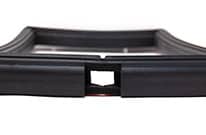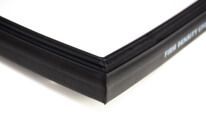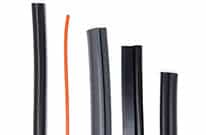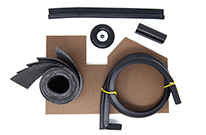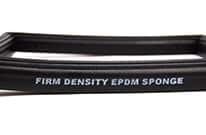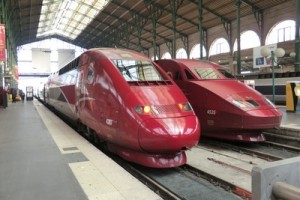 In this case study, you’ll learn how Elasto Proxy applied its expertise in seal design, compound selection, custom fabrication and logistics to supply rubber door seals for passenger rail cars. How can we help you solve your sealing and insulation challenges?
In this case study, you’ll learn how Elasto Proxy applied its expertise in seal design, compound selection, custom fabrication and logistics to supply rubber door seals for passenger rail cars. How can we help you solve your sealing and insulation challenges?
Manufacturers of mobile equipment need to source rubber parts that meet all of their application and business requirements. When a manufacturer of mass transit vehicles needed to replace the door seals on passenger trains, Elasto Proxy applied its expertise in technical design, compound selection, custom fabrication, and logistics. In solving this sealing challenge, Elasto Proxy improved the original seal design and helped the mobile equipment manufacturer meet the urgent needs of an important customer.
As the rail car manufacturer explained to us, the existing seals on some passenger cars had become worn and were leaking. The manufacturer’s customer, a major passenger rail service in the Northeastern United States, wanted to solve this problem quickly. In turn, Elasto Proxy needed to create new door seals in less than two weeks and send them to Philadelphia for installation. Since the “test train” for these replacement seals would remain at the station for less than 24 hours, ease-of-installation was also important.
Technical Design and Rubber Door Seals
Right away, Elasto Proxy’s technical team faced a design challenge. Instead of blueprints, drawings, or CAD files, the rail car manufacturer sent an old, worn-out seal from one of the passenger trains. The rubber had deteriorated, but our technical knowledge and application expertise helped to fill in the gaps. Using SolidWorks, Elasto Proxy designed a new seal to fit the existing space. Moreover, this seal design represented an improvement over the original door seal in terms of functionality.
Sealing suppliers need to understand that railcar doors must shut tightly enough to keep out wind and weather, but not so tightly that a closed door can endanger passenger safety if an item of clothing (such as a jacket or shirt sleeve) becomes trapped. As an experienced supplier of rubber parts to the mass transit industry, Elasto Proxy accounted for these and other requirements in its technical design. Our solutions providers also applied their technical knowledge and application expertise by recommending the right rubber.

Compound Selection and FST Standards
Because rubber compounds can affect human health, the mass transit industry needs door seals that meet published standards for fire, smoke, and toxicity (FST). Railcar designers prefer lightweight elastomers that can help to reduce fuel costs, but some combustion reactions produce toxins that endanger passenger health and safety. North American specifications differ from European standards, and cities such as Chicago have their own FST requirements.
There are also specific industry standards to consider. For example, Bombardier SMP-800 C limits the concentration of toxic gases that can be generated by materials used in ground transportation vehicles. ASTM E162 and ASTM E662 from ASTM International define standard test methods for flammability and smoke density. The neoprene rubber that Elasto Proxy recommended met the required FST standards, and offered a balanced combination of properties such as physical toughness and weather resistance.
Custom Fabrication for Rail Car Manufacturers
To produce the door seals that the rail car manufacturer needed, Elasto Proxy also applied its expertise in custom fabrication and logistics. First, our water jet cutting machine made fine, fast cuts to the rubber profiles. Unlike die cutting, water jet cutting doesn’t require tooling or lengthy setup times, and won’t put significant pressure on the profile. Elasto Proxy also offers a choice of splicing solutions and taping for temporary or permanent fastening.
Finally, Elasto Proxy demonstrated its commitment to the rail car manufacturer by shipping the replacement seals to Philadelphia in under two weeks. Maintenance personnel then installed the door seals during a tight, 24-hour time period. The rubber parts that we supplied fit perfectly, and were installed in time for the train to get back on track and make its next run. For sealing solutions that matter when you need them the most, Elasto Proxy delivers.

How Can We Help You?
As an experienced supplier of rubber products for mobile equipment, Elasto Proxy is ready to put its technical knowledge and application expertise to work for you. Do you need door seals, window seals, or other interior or exterior components for passenger rail cars or other types of mobile vehicles? Please contact us now and let us know what you need.





